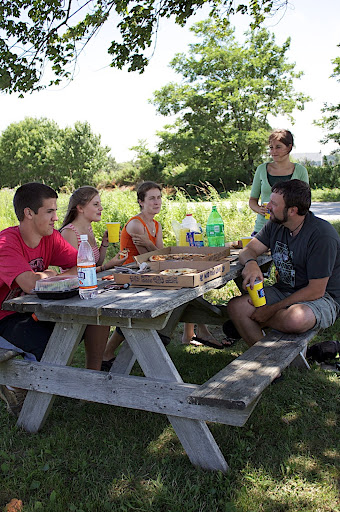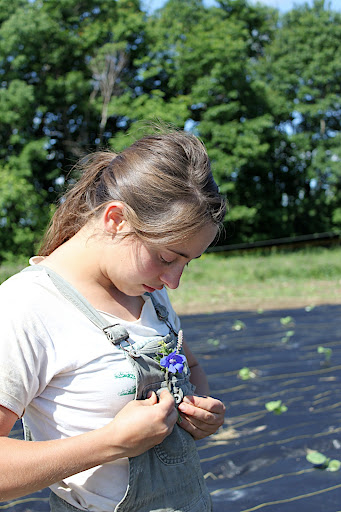Five months ago, I turned in the first draft of Farms and Fables.
Yesterday, I completed the "final draft" - as final as it gets before design process and rehearsals start.
It's an old writers' adage that you have to "kill your darlings" and what people mean by that is that you have to be willing to cut stuff, even stuff you're desperately in love with, if it isn't a meaningful part of the project as a whole.
You could think of it another way, to the tune of growing: You can't focus just on the individual parts of a plant - you have to understand the plant as a whole. For example, keeping a tomato plant trimmed down to one primary life-giving vine can do a great deal to strengthen the plant as a whole and improve its fruit. The leaflets and the suckers, the secondary and tertiary branches splitting off that vine may look lovely and leafy, and like they'd bear bountiful fruit. But having multiple main stems stresses the plant, leading to smaller tomatoes, more foliage, and greater pest problems.

However you want to think of it, being willing - as an artist and a grower - to say "This should stay, but this should go" is incredibly important to the health of what you produce. For no other project have I killed as many of my darlings as I have during the writing of Farms and Fables and, ultimately, I am so glad that I did. The play is the better for it. I'm a better playwright for having learned to do it. But boy, was it sometimes hard.
Since there are so many passages that have been composted between Draft 1 and Draft 3, I thought I would share a few that were more difficult than others to let go of. These are snippets - some stage directions, some bits of dialogue - that, for a variety of different reasons, were scrapped. The play is healthier without them, but that doesn't mean I don't still regard them with wistful affection.
1. A monologue of Teddy's (the character who became Mitch)
TEDDY: It isn’t the same farm. I tried to love it like it was. This whole year. I tried. Half the house is gone, all Grandma’s quilts in the pantry, the old tools you always made me save. The old wood fence is gone. Where we used to write notes, leave them for Dad in that hole in the fencepost. Our tree burned. That thing was older than the USA I bet. The barn’s gone. It’s always been hard but I used to have these things here to remind me what I’m doing it for. That barn. Days when it seemed too hard and nothing was going to work out I used to be able to walk into the barn and remember: how you and me used to sleep out there sometimes, summer nights, itchy in the hay, and we’d wake up when dawn was on its way and the kittens started chasing swallows. Someone, Mom or Uncle Dan, would be coming in for milking, and I knew that Grandma had done the milking there when they were kids, and I knew the name of all the smells I smelled, and I knew what had to be planted or weeded or harvested that day, and now the barn’s gone, everything’s gone, and I don’t know what it is. The land. That used to be a farm.
2. Sidney's visit to Plentiful Valley Farm
SIDNEY in front of a sign: “Plentiful Valley Farm.” She wanders past fields choked with weeds. A few plants reach their tendrils out towards her from within the weed-prison, gasping for air and for water. She passes through a tractor graveyard strewn with sad metal corpses, mourned by one half-dead John Deere crying oily tears. A bored and bony farm animal wanders past her, more skeleton than beast. She comes to a house, knocks on the door.
3. Lily realizes the barn is burning
TEDDY: The air was dry like a dead grasshopper. All day I was sweaty as a devil, but the wind was strong and dried the sweat right away. I knew it was a bad day.
WEEDER 1: We had spent the morning trying to save the lettuce, but because it was so hot it had all bolted and was not good for wholesale. And after lunch we weeded and weeded but the weeds seemed never to get any less. We were driving home in the truck when our cell phones began to ring.
LILY: Are you in your truck? Get back here.
WEEDER 2: Lily knows when our day is over, it is over.
LILY: Get back here. Get back here.
WEEDER 2: Unless it is something seriously wrong.
LILY: Get back here.
WEEDER 2: She couldn’t explain anything. Just saying “Get back here” again and again.
LILY: There’s a fire on the farm.
WEEDER 1: Where? I don’t see any fire.
WEEDER 2: We didn’t understand. We’d seen nothing, no smoke, nothing.
LILY: There’s a fire on the farm. A fire.
WEEDER 1: A fire on the farm, a fire on the farm.
WEEDER 2: She just kept saying it. Finally we realized. She meant her brother’s farm. Her old farm. Family farm.
LILY: We have to go.
WEEDER 2: But she was shaking too hard. So my cousin drove us.
4. The fantasy sale of the Martin (now, Dayfield) farm
A cow is led in, wearing a huge ear tag that reads “Martin’s”. The cow’s body is marked, divided into different cuts of meat. A group of soberly dressed BUSINESSPEOPLE approach the cow and lay claim to different parts of its body. They then beat it to death. The cow is dragged off. SIDNEY, dressed as she was when she was a waitress, enters with plates of hamburgers. She calls off the names of the companies that have bought Martin land. “Wal-Mart! Webber & Webber Development! L.L. Bean! A rich guy from Boston! The Republican Party! Terrorists!” One of the BUSINESSPEOPLE always answers – “That’s me!” or “Over here!” or the like – and SIDNEY brings him/her a hamburger. The BUSINESSPEOPLE find the hamburgers delicious.
5. The foil of "agricultural tourism"
TEDDY: Have you been to Baker Farm? That place is no farm. They sell tote bags! They sell blueberry pies they bought from the deep freeze at Hannaford! Bill Baker!
LILY: The Bakers have the most organic U-Pick berry acreage in Southern Maine.
TEDDY: And you’ll pay eight bucks a quart plus your unborn child and both pinky toes for it! And they still couldn’t pay high school kids to weed the stuff without they’re getting subsidized!
LILY: I know how you feel about it.
TEDDY: And for what? Hayrides and cornstalk mazes in October. It’s not a farm, it’s an agricultural amusement park. Bill Baker!
6. Multiple variations on the fable of "The Little Red Hen" - this being my favorite
CHILD: The Little Red Hen woke up one morning at the crack of dawn and saw it was the time of year for planting wheat.
She went out blinking into the early morning sun and began to plant.
Along came the Dog, out for a morning stroll.
“That looks like hard work!” said the Dog. “I’ll help you if you’ll teach me how!”
“Oh, I don’t need help!” said the Little Red Hen. “It’s much easier if I just do it.”
“Suit yourself,” said the Dog, and kept walking.
The sun rose higher in the sky and the Little Red Hen kept on planting. It was tiring work, and she was starting to sweat and feel just a little dizzy.
Along came the Cat, chasing a butterfly.
“Hey, Little Red Hen!” said the Cat. “Looks like you still have a lot left to do. You need a hand? I’m happy to help if you show me what to do.”
“No thank you,” panted the Little Red Hen. “I’m doing just fine!”
“If you say so,” purred the Cat, and went back to chasing the butterfly.
In the scorching afternoon sun the Little Red Hen planted on, ever more slowly, dragging herself forward along the plowed rows. Her feathers felt like they were wilting in the heat.
Along came the Rat, nibbling on a hunk of bread.
“Wow, you look worn out,” said the Rat. “I don’t know much about wheat, but I can help you plant if you want. Or at least bring you a glass of water.”
The Little Red Hen could barely make a sound through her dry, swollen throat, but she managed to croak out, “No thanks.”
The Rat shrugged and went about more Rat-business.
At the end of the day the Dog, the Cat, and the Rat went to see how the Little Red Hen was doing. They found the field fully planted, and the Little Red Hen lying at the end of the field with her empty sack of wheat. The heat and dehydration had been too much for her and now she was dying. With her final breath she gasped out, “Dear Dog and Cat and Rat, I have planted the wheat but I won’t be here to harvest the wheat or grind the wheat into flour or bake the flour into bread or eat the bread. You will have to do it all yourselves.” And then she died.
The Dog, the Cat, and the Rat stood looking at her in silence. Finally the Dog spoke up: “But who will teach us how to do all those things?”
The three animals looked at each other and shrugged.






